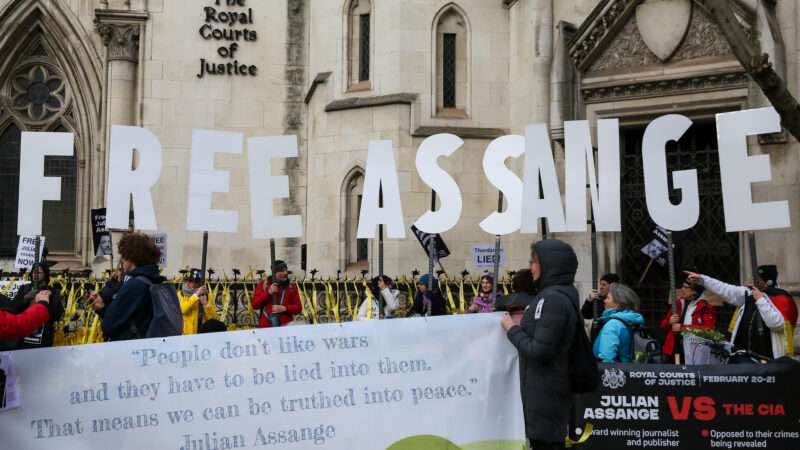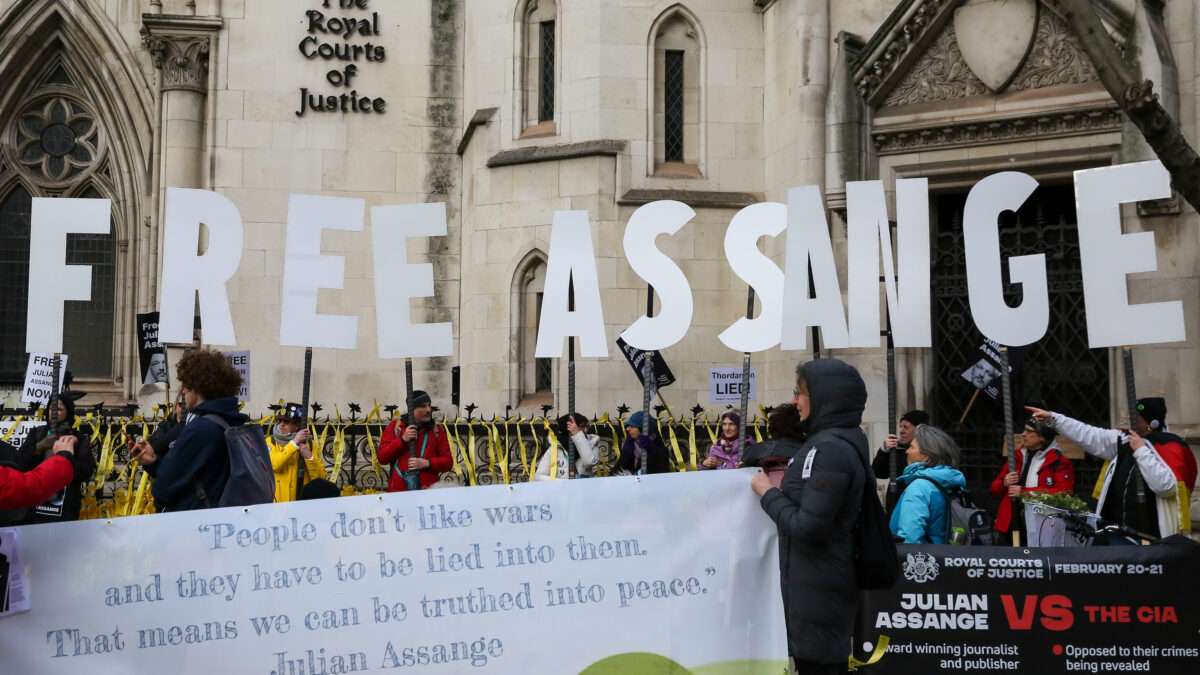The Biden Administration Is Bent on Setting an Alarming Precedent by Prosecuting Julian Assange

WikiLeaks founder Julian Assange has been imprisoned in London for nearly five years, pending extradition to the United States so he can be prosecuted for violating the Espionage Act by publishing classified information. Since that amount of time behind bars is about the same as the four-to-six-year prison term that Justice Department lawyers have said Assange would be likely to serve if convicted, you might think the Biden administration would be ready to reconsider this case, especially since it poses an alarming threat to freedom of the press. Instead, the U.S. government's lawyers are back in London for yet another hearing, which Assange's attorneys describe as a last-ditch attempt to block his extradition.
Recognizing the First Amendment implications, the Obama administration declined to prosecute Assange for obtaining and disclosing confidential State Department cables and military files leaked by former Army intelligence analyst Chelsea Manning in 2010. After all, leading news organizations in the United States and around the world had published stories based on the same documents, and those acts of journalism likewise could be construed as felonies once this precedent was established. So could the routine practices of reporters who cover national security, which commonly involves divulging information that the government prefers to keep secret.
Despite those concerns, the Trump administration decided that Assange should be locked up for doing things that The New York Times et al. do on a regular basis. All but one of the 17 counts in Assange's latest federal indictment relate to obtaining or disclosing "national defense information," which is punishable by up to 10 years in prison. Theoretically, Assange could face 160 years in prison for those counts alone, although the government's lawyers say it probably would be more like the amount of time he already has served in the United Kingdom. Manning herself—who, unlike Assange, violated the terms of her government employment—received a 35-year sentence but was released after seven years thanks to Barack Obama's commutation.
"Some say that Assange is a journalist and that he should be immune from prosecution for these actions," John Demers, then the head of the Justice Department's National Security Division, told reporters after the Assange indictment was announced in May 2019. "The department takes seriously the role of journalists in our democracy and we thank you for it. It is not and has never been the department's policy to target them for reporting." There is no need to worry, Demers suggested, because Assange is "no journalist."
This line of argument misconstrues the "freedom…of the press" guaranteed by the First Amendment, which applies to mass communication generally, not just the speech of people whom the government deigns to recognize as journalists. Demers' assurance is similar to the reasoning that the U.S. Court of Appeals for the 5th Circuit recently applied in counterintuitively concluding that treating journalism as a crime is not "obviously unconstitutional."
That case involved Priscilla Villarreal, a Laredo, Texas, gadfly and citizen journalist who was arrested in 2017 for violating Section 39.06(c) of the Texas Penal Code. Under that previously obscure law, a person who "solicits or receives" information that "has not been made public" from a government official "with intent to obtain a benefit" commits a third-degree felony, punishable by two to 10 years in prison.
Texas defines "benefit" as "anything reasonably regarded as economic gain or advantage." According to the arrest affidavits, the "benefit" that Villarreal sought was a boost in Facebook traffic. Section 39.06(c) defines "information that has not been made public" as "any information to which the public does not generally have access" that is also "prohibited from disclosure" under the Texas Public Information Act. The arrest affidavits did not address the latter requirement at all.
Like the Espionage Act, Section 39.06(c) purportedly criminalizes common reporting practices—in this case, obtaining information about a public suicide and a fatal car accident from a "backchannel source" at the local police department. Writing for the 5th Circuit majority in Villarreal v. Laredo, Judge Edith Jones did not try to hide her disdain for Villarreal, an independent, uncredentialed journalist who files her unfiltered reports on Facebook instead of publishing vetted and edited stories in a "mainstream, legitimate" news outlet.
"Villarreal and others portray her as a martyr for the sake of journalism," Jones wrote. "That is inappropriate. She could have followed Texas law, or challenged that law in court, before reporting nonpublic information from the backchannel source. By skirting Texas law, Villarreal revealed information that could have severely emotionally harmed the families of decedents and interfered with ongoing investigations. Mainstream, legitimate media outlets routinely withhold the identity of accident victims or those who committed suicide until public officials or family members release that information publicly. Villarreal sought to capitalize on others' tragedies to propel her reputation and career."
Although Jones implies that Villarreal's arrest was prompted by concern for "the families of decedents," Villarreal plausibly argued that it was actually punishment for her outspoken criticism of local law enforcement agencies. In any case, there is no First Amendment exception for reporting that might offend or disturb people. And Jones' characterization of Villarreal's work as "capitaliz[ing] on others' tragedies to propel her reputation and career" is an apt, if cynical, description of what many journalists do, even when they work for "mainstream, legitimate media outlets." Jones apparently is unfamiliar with the bread and butter of local news organizations and has never heard the expression, "If it bleeds, it leads."
The seven dissenting judges saw the situation differently. "If the First Amendment means anything," Judge James C. Ho wrote in a dissent joined by five of his colleagues, "surely it means that citizens have the right to question or criticize public officials without fear of imprisonment." Judge James E. Graves Jr. likewise complained that "the majority opinion will permit government officials to retaliate against speech while hiding behind cherry-picked state statutes."
Judge Stephen A. Higginson noted that Thomas Paine, who wrote "the pro-independence pamphlet that historian Gordon Wood describes as 'the most incendiary and popular pamphlet of the entire revolutionary era,'" was, like Villarreal, a "citizen-journalist." Upholding "the text of the Constitution, as well as the values and history that it reflects," he said, "the Supreme Court guarantees the First Amendment right of engaged citizen-journalists, like Paine, to interrogate the government." Jones, by contrast, presumably would view Paine as disreputable, since he did not work for a "mainstream, legitimate media outlet."
Assange's critics, including some professional journalists, have proposed a similar distinction, arguing that he does not deserve the First Amendment's protection because he is not a "real" journalist. But whatever you might think of Assange's opinions, his tactics, or the care he exercised in publishing classified material, that distinction is not grounded in the Constitution and will not hold in practice.
The editors and publishers of The New York Times, The Guardian, Le Monde, Der Spiegel, and El País recognized as much in 2022, when they urged the Justice Department to drop the case against Assange. In ignoring that advice, the Biden administration seems bent on establishing a dangerous precedent that replaces the First Amendment's guarantee with the whims of prosecutors.
The post The Biden Administration Is Bent on Setting an Alarming Precedent by Prosecuting Julian Assange appeared first on Reason.com.

